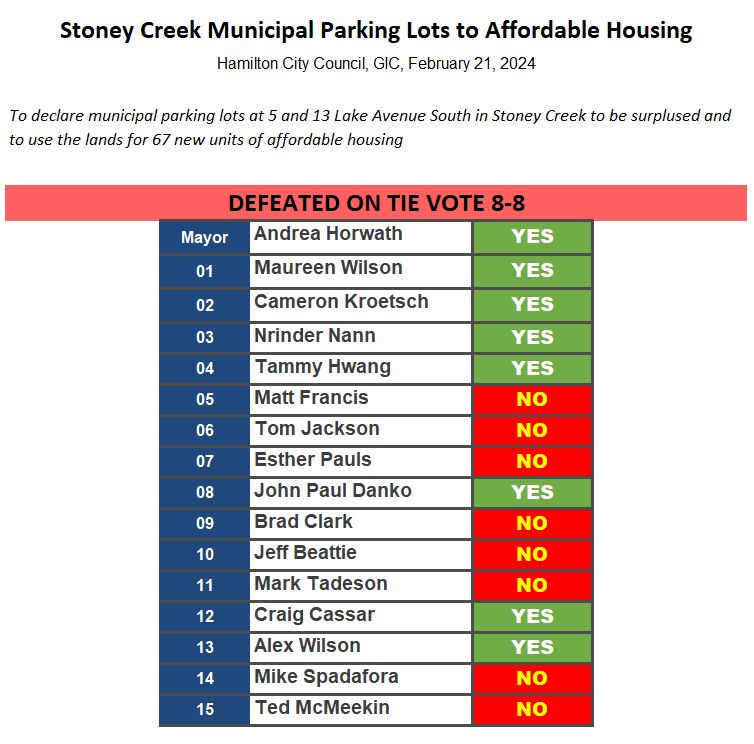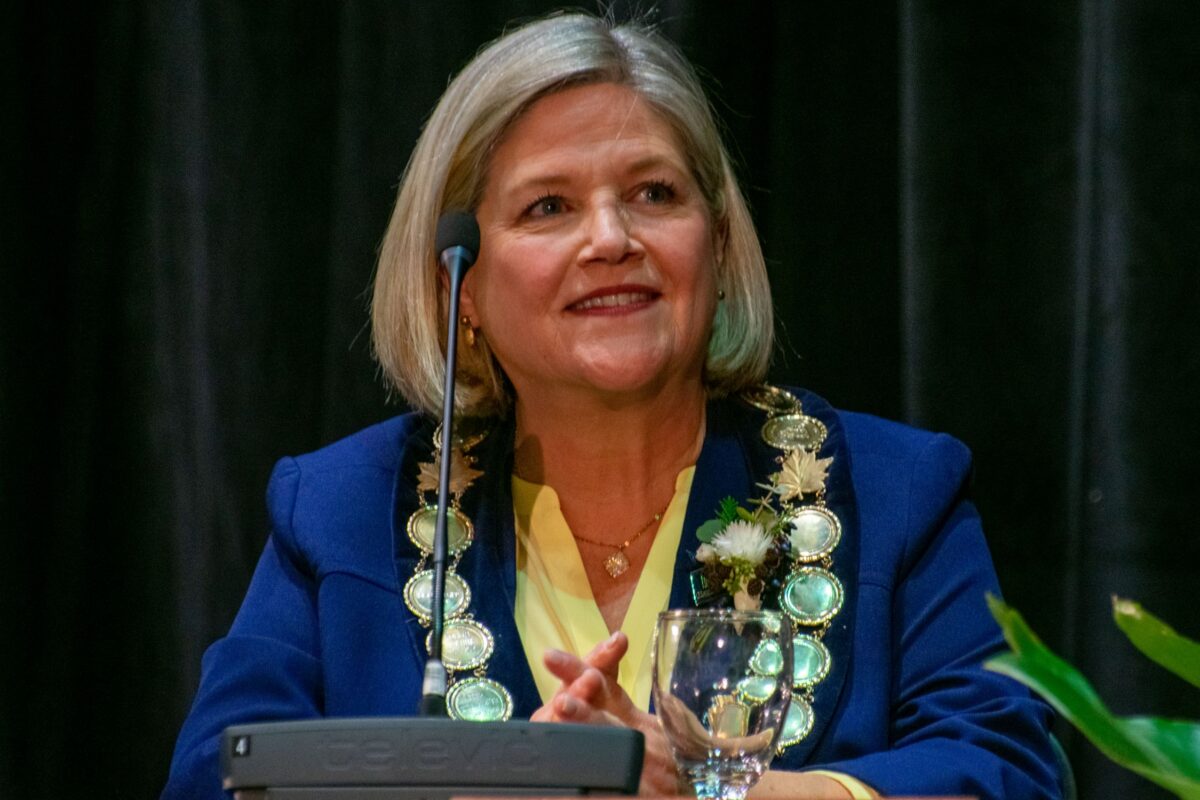Mayor Andrea Horwath is publicly calling on eight members of Hamilton City Council who voted against an affordable housing proposal to reconsider their opposition before next Wednesday’s Council ratification meeting.
A proposal to convert two municipal parking lots, with 57 spaces, into 67 affordable housing units was defeated in an eight-to-eight tie vote at the General Issues Committee yesterday. [The final vote will be Wednesday, February 28, at the Council ratification meeting.]
Ward 5 Councillor Matt Francis opposed the proposal in his ward, arguing that free municipal parking is critical municipal infrastructure for Downtown Stoney Creek’s businesses and seniors.
“The main objection was not to affordable housing. I think we heard that here with the delegates today,” Francis stated. “It was about saving the parking lot, especially in an increasingly busy downtown core.”
Councillors Tom Jackson (Ward 6), Esther Pauls (Ward 7), Brad Clark (Ward 9), Jeff Beattie (Ward 10), Mark Tadeson (Ward 11), Mike Spadafora (Ward 14), and Ted McMeekin (Ward 15). The eight supported Francis due to concerns about losing parking in suburban communities.

Strong Mayor Powers: Mayor Horwath Can Veto and Implement Stoney Creek Affordable Housing
Section 284.11 of the Municipal Act states the head of council can override bylaw decisions that “could potentially interfere with a prescribed provincial priority.”
Ontario Regulation 580/22 declares “building 1.5 million new residential units by December 31, 2031” as a prescribed provincial priority.
Declaring the Stoney Creek parking lots as ‘surplus’ requires an enacting bylaw, and involves building new residential units.
Therefore, the Mayor can exercise veto power to override council opposition to this project.
Veto is a Political Decision, With Political Consequences
Obviously, the Mayor wants to avoid the controversy surrounding using veto powers. During the coming days, Mayor Horwath will try to convince one opposing councillor to change their position or be absent from the Feb. 28 vote.
Using a mayoral veto will have significant political ramifications. It will cement growing divisions among the sixteen members of Council.
Presently, an opposition block of six has formed against the annual budgets. These six (Francis, Jackson, Clark, Beattie, Tadeson, and Spadafora) all voted against the Stoney Creek proposal.
If these six become a formal opposition bloc, Mayor Horwath cannot create a reliable governing coalition.
Councillors Cameron Kroetsch (Ward 2) and Alex Wilson (Ward 13) will not be reliable votes for the mayor. McMeekin’s votes have differed from the mayor numerous times. Pauls tends to decide her votes issue by issue.
A divided council will fail to govern Hamilton effectively, and in the past, Hamiltonians have held mayors responsible for council dysfunction.
How A Veto Works: Timelines and Procedure.
In this circumstance, the mayoral veto can only be exercised following a council decision. The Mayor has two days following a council decision to issue a veto.
In this instance, if Council remains deadlocked and the Stoney Creek projects are defeated at the Wednesday, February 28 meeting, the Mayor must declare her veto by the end of business on Friday, March 1.
The City Clerk must publicly post the veto notice by the next business day.
Following a veto, Council can override the veto with a two-thirds majority vote within 21 days of the Clerk’s notice.
Veto Underminds Local Democracy: Experts
In a recent academic paper, University of British Columbia Law Professor Alexandra Flynn argues that using strong mayor powers to veto a council decision undermines local democracy.
Flynn describes the creation of strong mayor powers to implement ‘provincial priorities’ as “overreach” by the Province that undermines majority rule at the municipal level and is “incompatible with the principle of democracy.”
Flynn argues that municipal councils should challenge this overreach by resisting the use of strong mayor powers. Majority council rule “legitimizes the claim that municipalities are democratic governments, not mere administrative units.”
“Bill 39 does not mandate that the mayor exercise strong mayor powers in relation to provincial priorities. Instead, it is the mayor’s individual decision. To date, the notion of a code of good governance that includes a commitment to democracy has been endorsed in municipalities across the province,” Flynn noted when she wrote the article.
Other municipal experts have written against strong mayor powers, including Western prof Zack Taylor.
Production Details v. 1.0.0 Published: February 22, 2024 Last edited: February 22, 2024 Author: Joey Coleman Edit Record v. 1.0.0 original version


In this case a veto would effectively be the tie breaking vote in a deadlock. It doesn’t seem especially democratic a tie results in a defeat, and in many governing bodies there is a tie breaking vote mechanism, like the vice-president in the US.
Vetoing a clear majority may be problematic but I see nothing undemocratic about an elected leader breaking a deadlock to move the city forward.
This is a good point Mike. (Though yes the Mayor herself is one of the eight already). But even then, it’s not unheard of as a tie breaking mechanism.